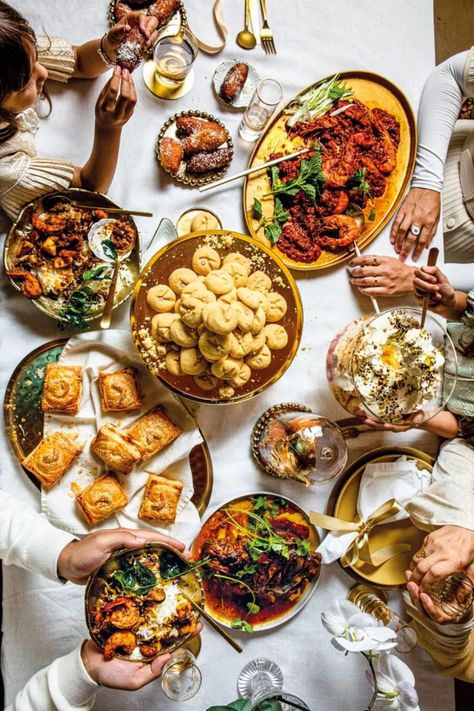Eid offers a culinary journey that tantalizes the senses and nourishes the soul. As families gather to share laughter, stories, and meals, they forge cherished memories that will last a lifetime.
Now, let’s delve into the rich tapestry of Eid delicacies across various cultures in the region.
United Arab Emirates
For UAE, One of the signature dishes enjoyed during Eid celebrations is “ouzi,” a fragrant concoction of slow-cooked lamb or goat mixed with rice and garnished with fried pine nuts. Another is chicken “machboos,” featuring tender chicken thighs cooked in a flavorful blend of tomatoes, onions, and herbs.
For those with a sweet tooth, “luqaimat,” small dough balls dipped in honey, offer a delectable treat to round off the festive feast
Morocco
Meanwhile, in Morocco, Eid morning begins with the comforting aroma of “laasida,” a nourishing dish made from couscous, butter, and honey.
During the day, families gather around the table to savor the rich flavors of “tajine,” a hearty stew brimming with tender meat or chicken, vegetables, and dried fruits. This traditional dish embodies the essence of Moroccan cuisine, showcasing a harmonious blend of savory and sweet notes.
Saudi Arabia
In Saudi Arabia, particularly in the bustling city of Jeddah, Eid is a time to indulge in traditional Hijazi delicacies such as “areeka” and “masoob.”
“Areeka”, a fragrant rice dish infused with spices and topped with succulent meat, is a culinary delight that reflects the rich cultural heritage of the region. “Masoob,” a delectable dessert made from mashed bananas, bread, and cream, adds a touch of sweetness to the festivities.
Egypt
In Egypt, families come together to prepare a variety of Eid cookies, including “Kahk,” “Petit four,” and “Ghoriba,” which are lovingly crafted and shared with loved ones.
Lebanon
Meanwhile, in Lebanon, traditional recipes such as “Mouloukhiye,” “Moughrabiye,” and “Rezz aa Djeij” take center stage, showcasing the culinary diversity of the region.
And for desserts, they eat “Kaak,” “Knafeh,” and “mammal.”
Each of these countries has its own traditions, and every one of us even has their own food rituals during Eid. What’s yours?
We Also Said: Don’t Miss It…Celebrate Ramadan In Style With These Arab Caterers



